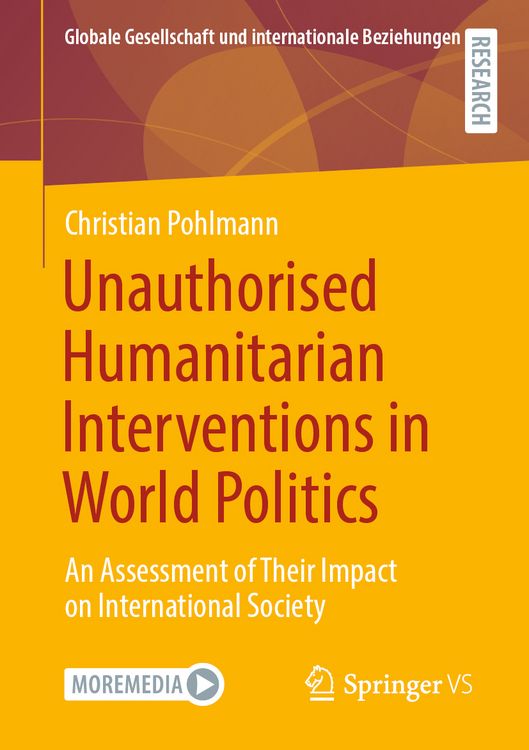Unauthorised Humanitarian Interventions in World Politics An Assessment of Their Impact on International Society
-
- Taschenbuch ausgewählt
- eBook
-
Sprache:Englisch
81,99 €
inkl. MwSt,
Lieferung nach Hause
Beschreibung
Details
Einband
Taschenbuch
Erscheinungsdatum
03.12.2020
Verlag
Springer Fachmedien Wiesbaden GmbHSeitenzahl
296
Maße (L/B/H)
21/14,8/1,8 cm
Gewicht
411 g
Auflage
1st edition 2021
Sprache
Englisch
ISBN
978-3-658-32178-9
The question if states should intervene in massive humanitarian emergencies without a legal right to do so, is still object of an important debate in the theory and practice of international relations. This situation has not changed with the emergence of the ‘Responsibility to Protect’ norm, which stopped short of a right to intervene without a Security Council authorisation. The book assesses the impact of such unauthorised humanitarian interventions on international society and regions; it is written in the context of the English School of International Relations. Based on empirical studies the author argues that they can be progressive-constructive for international order, if conducted with explicit legitimacy, integrity, and great power participation. The argument is based on the analysis of six cases conducted between 1946 and 2005. Specific consideration is given to the cases of Liberia (1990) and Kosovo (1999). In sum, the book contributes to the solidarism-pluralism debate and the discourse on humanitarian interventions.
Weitere Bände von Globale Gesellschaft und internationale Beziehungen
-
International Corporations as Actors in Global Governance von Maxim Baer
 Band 6
Band 6Maxim Baer
International Corporations as Actors in Global GovernanceBuch
49,99 €
-
Linking of Emissions Trading Schemes von Matthias Machinek

Matthias Machinek
Linking of Emissions Trading SchemesBuch
87,99 €
-
Unauthorised Humanitarian Interventions in World Politics von Christian Pohlmann

Christian Pohlmann
Unauthorised Humanitarian Interventions in World PoliticsBuch
81,99 €
-
Taming the Big Green Elephant von Ariel Macaspac Hernández

Ariel Macaspac Hernández
Taming the Big Green ElephantBuch
48,99 €
-
Ascending China and the Hegemonic United States von Jörg Vogelmann
 - 10%
- 10%Jörg Vogelmann
Ascending China and the Hegemonic United StatesBuch
124,99 €
139,09 €* -
The Politicization of Ethnicity as Source of Conflict von Ademola Adediji

Ademola Adediji
The Politicization of Ethnicity as Source of ConflictBuch
49,99 €
-
Civilian Protection in Armed Conflicts von Robert Schütte

Robert Schütte
Civilian Protection in Armed ConflictsBuch
49,99 €
-
The Impact of Private Actors on Security Governance von Gloria Westermeyer

Gloria Westermeyer
The Impact of Private Actors on Security GovernanceBuch
49,99 €
-
European Energy Security von Nataliya Esakova

Nataliya Esakova
European Energy SecurityBuch
48,99 €
Unsere Kundinnen und Kunden meinen
Verfassen Sie die erste Bewertung zu diesem Artikel
Helfen Sie anderen Kund*innen durch Ihre Meinung
Kurze Frage zu unserer Seite
Vielen Dank für dein Feedback
Wir nutzen dein Feedback, um unsere Produktseiten zu verbessern. Bitte habe Verständnis, dass wir dir keine Rückmeldung geben können. Falls du Kontakt mit uns aufnehmen möchtest, kannst du dich aber gerne an unseren Kund*innenservice wenden.
zum Kundenservice